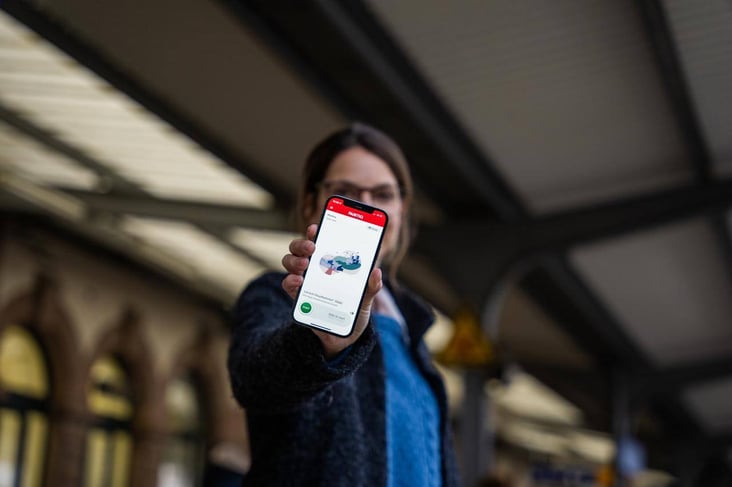Bern, 20 March 2022. Less than eight months after recording its 30 millionth journey, FAIRTIQ reached a new milestone: a total of 50 million journeys have now been made with the innovative eTicket app. A contributory factor behind this rapid growth is the recent addition of several major transport regions to the FAIRTIQ partner network.
Despite the tough business climate for the public transport sector, the uptake of FAIRTIQ technology continues to go from strength to strength. Even though pandemic directives and remote working recommendations have led to emptier buses and trains in recent months, the use of the eTicket app has continued to rise. FAIRTIQ CEO Gian-Mattia Schucan is thrilled with the latest developments, “50 million journeys are incontrovertible proof that our solution is meeting the real needs of our partners and public transport users.”
The Swiss mobility start-up has observed a growing preference for contactless travel since the start of the pandemic. Also, many commuters have switched to FAIRTIQ because it offers an alternative that is better suited to their new hybrid working arrangements – mix of remote and office-based working – than the standard season ticket. Thanks to the integrated fare cap feature, passengers only pay for the journeys they actually make and never pay more than the price of a one-day travel pass for their daily public transport use; some fare areas have even introduced a weekly fare cap.
Added to these positive developments, the expansion of FAIRTIQ into more regions outside Switzerland has helped to accelerate passenger use of its e-Ticket technology. Bus and train passengers in over 40 transport areas can now enjoy contactless travel courtesy of the FAIRTIQ app, not only in their home region but also in all other participating regions. In the last six months, North Rhine-Westphalia, the largest state in Germany, as well as other German regions like Freiburg, Karlsruhe, Aschaffenburg and Ingelheim, to name but a few, has greatly extended FAIRTIQ’s geographical reach. From April onwards, the French regions of Occitanie and Nouvelle Aquitaine will become available, where the pilot projects have already recorded a high demand.
The greater flexibility that this has brought to public transport services is set to increase further in the coming months thanks to constant improvements and additions to the FAIRTIQ technology and the start-up’s continued international expansion. Only a couple of weeks ago, FAIRTIQ launched a pilot project in partnership with BVG, Berlin’s public transport company.
About FAIRTIQ
FAIRTIQ is an innovative Swiss start-up from Bern which aims to make traveling by public transport as easy as possible. The ticketing app and technology, developed and operated by FAIRTIQ, is accredited according to strict quality criteria. The app, which is free to download, can be used across the entire public transport network in Switzerland and Liechtenstein, as well as in several parts of Germany and Austria. The company can count on more than 100 highly motivated professionals to handle day-to-day operations and make sure that the product is the best that it can be. With over 50 million trips made to date, FAIRTIQ is the most successful iPhone- and Android-compatible check-in/check-out solution worldwide. FAIRTIQ has built up an impressive partner network of public transport providers and associations in Switzerland, Germany, Austria and Liechtenstein. FAIRTIQ technology also powers Easy Ride, the Swiss Federal Railways (SBB) app. Austrian Federal Railways (ÖBB) is also set to adopt FAIRTIQ technology, and pilot projects are already under way in Belgium and France.
How a journey with FAIRTIQ works
Before boarding the train, tram or bus, users check in to the app with a single swipe. This will generate a valid ticket for all public transport in the given region. Once the traveller has arrived at their desired destination, they can end the journey by either swiping the stop button or activating the Smart Stop feature, which will carry out the process for them. The app recognises the distance travelled based on the device’s location data and charges the customer the best possible fare for the journey. For example, if the cost of a single journey exceeds the price of a one-day pass, the customer pays the cheapest of the two fares.






Share